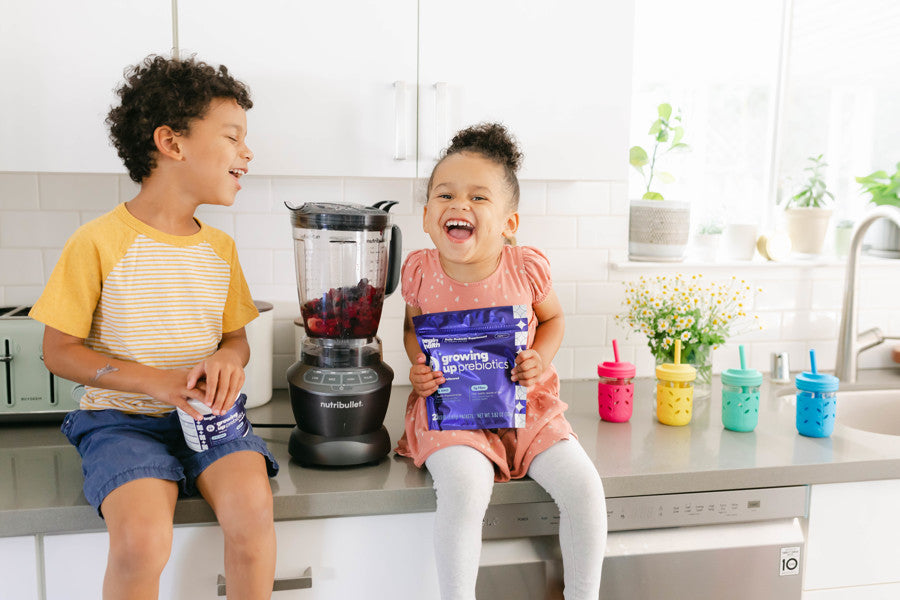Your Cart is Empty
Continue shoppingHow Long Does it Take for Prebiotics to Work in Kids?
Medically Reviewed by May Zhu, RDN | Published March 28, 2024
share this article

When it comes to gut health, every parent wants to know: How long does it take for Growing Up Prebiotics to work?
It's one of the most common questions we get, and the answer lies in the science.
While some kids may see small changes early on, real, lasting gut health benefits take time.
Let’s break down what to expect at each stage of the journey.
How Prebiotics Work
Prebiotics are non-digestible fibers that serve as fuel for beneficial gut bacteria. Instead of being broken down in the stomach, they travel to the intestines, where they nourish the good bacteria that support digestion, immune health, and overall well-being.
By feeding these friendly microbes, prebiotics help shape a healthier gut microbiome, leading to softer stools, better regularity, and long-term digestive support.
The Prebiotic Timeline: What to Expect
Short-Term: Small Improvements in Comfort (Days to Weeks)
In the first few weeks, some kids may experience mild digestive benefits, such as:
✔️ Less bloating or gas
✔️ Improved stool consistency
✔️ Better digestion overall
However, true microbiome shifts take time.
Prebiotics aren’t a quick fix like laxatives. Their job is to nourish gut bacteria so they can do their work naturally.
Medium-Term: The 6-Week Sweet Spot for Gut Health
What the research tells us:
✅ Chicory root fiber (inulin) supplementation for 6 weeks led to an increase in beneficial gut bacteria.
✅ Kids who consumed prebiotics had softer, more frequent poops, thanks to improved gut motility.
✅ Gut microbiota diversity improved, supporting better digestion and long-term gut health.
Begin Health Expert Tip:
This is why 6 weeks is the key milestone for noticing real improvements. Staying consistent during this period allows your child’s gut to fully adjust and thrive.
Long-Term: Lasting Gut Health Benefits (Beyond 6 Weeks)
The benefits of prebiotics don’t stop at 6 weeks.
In fact, they compound over time.
Regular prebiotic intake helps:
✔️ Maintain healthy digestion & stool regularity
✔️ Support a stronger gut microbiome for long-term well-being
✔️ Promote immune health (since 70% of the immune system lives in the gut!)
Many parents report continued improvements even months after starting prebiotics, reinforcing that consistency is key to unlocking long-term benefits.
How to Stay on Track (and Make It Easy!)
Since gut health is a long game, consistency is the biggest factor in seeing results. Many parents choose a subscription to make sure they never miss a day.
✔️ Delivered monthly, so you never run out
✔️ 15% off + hassle-free adjustments anytime
✔️ Stay on track effortlessly for lasting gut health
Final Takeaway: Stick with It for 6 Weeks!
Prebiotics don’t work overnight, but they do work with time. While some small improvements may appear early on, research shows that 6 weeks is the magic window for noticeable gut health benefits.
By sticking with a daily routine, you’re setting your little one up for a healthier gut and happier digestion, both now and in the long run.
Need more support?
📌 Join our Parent Group on Facebook to connect with other parents.
📌 Learn more in our Knowledge Base for gut health insights.
Your little one’s gut is growing stronger every day. Keep going!

Author
May Zhu, RDN
Trending

How to Transition Kids Off Stool Softeners Safely
read now
How to Know If Your Kid Needs a Stool Softener (or Something Else)
read now
Why Parents Are Choosing Prebiotics Over Stool Softeners for Kids
read now






